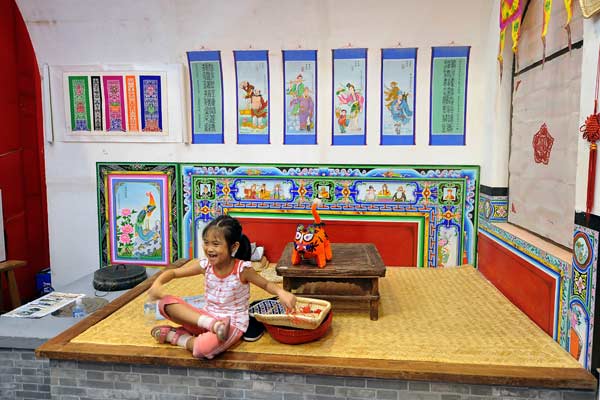Bed-stove status stirs debate
 0 Comment(s)
0 Comment(s) Print
Print E-mail China Daily, March 21, 2014
E-mail China Daily, March 21, 2014
Both northern China and South Korea developed ancient heating systems, but China won't follow its neighbor in applying for a UNESCO listing. Sun Yuanqing and Chen Jie find out why.
 |
|
China's kang (traditional bed-stove) resembles South Korea's ondol, a UNESCO world heritage candidate. [Photo/China Daily] |
China is not seeking UNESCO World Cultural Heritage status for the kang bed-stove, a heated bed commonly seen in northern China, despite South Korea's plans to have a similar under-floor heating system included on the list, the Ministry of Culture said on Tuesday.
South Korea is planning to apply for World Heritage status for the ondol, a traditional heating technology, local media reported on Sunday.
The news prompted Chinese netizens to call for the same action for the kang bed-stove.
"Applying for World Heritage status is not like rushing to register a trademark. We respect other countries' choices, but we also have our own priorities," says Ma Shengde, deputy director-general of the Intangible Cultural Heritage Department of the Ministry of Culture.
"Intangible cultural heritage is inherited by people from one generation to another while they are living and moving, so actually it's very often that several neighboring countries share the same or very similar tradition," Ma says.
According to UNESCO's 2003 Convention for the Safeguarding of the Intangible Cultural Heritage, every country with the same heritage has the right to apply.
Citing maqam as an example, Ma says both Iraq and Azerbaijan had submitted their applications in 2003, then China applied for the Uygur muqam to be listed in 2005. The same year, China and Mongolia also jointly applied to have urtiin duu, the traditional long folk song, included on the UNESCO's heritage list.
An ondol is a kind of traditional Korean underfloor heating system that uses wood as fuel. Today it usually uses heating pipes under the floor.
A Chinese kang bed-stove is built with bricks and provides heating and cooking devices at the same time.
Although the two are quite similar, the Korean ondol has its own characteristics that distinguishes it from the Chinese kang, Ma says.
"The fact that the ondol is seeking the status does not mean that kang is going to lose the opportunity," Ma says, responding to speculation that having ondol on the World Heritage list will deprive kang of the right to be on it, too.
China tops the list, with 38 intangible cultural heritages recognized by UNESCO.
"The final goal of applying for the UNESCO listing is to protect and inherit the heritage," says Zhang Ling, deputy director of the department that cooperates with the Intangible Cultural Heritage Department to apply for the UNESCO list.
"China is a big country with long history, dozens of ethnic groups, rich traditions and a large amount and variety of cultural heritages, which means we have contributed a lot to human civilization and also means that we have more important things than kang to protect at the moment.
"Even within the genre of architecture, we have more important things to preserve."
South Korea registered the Gangneung Danoje Festival as a UNESCO intangible cultural heritage in 2005, causing much controversy among the Chinese public as the festival is rooted in Chinese culture.
The Korean festival is similar to China's Dragon Boat Festival.
But South Korea's confidence and dedication to its own cultural heritage is worth learning from, says Gao Wei, secretary-general of the Beijing Folklore Society.
"Whether or not they succeed, it reminds us to preserve and innovate on traditions. We have so many cultural heritages that are on the verge of disappearing," Gao adds.






Go to Forum >>0 Comment(s)